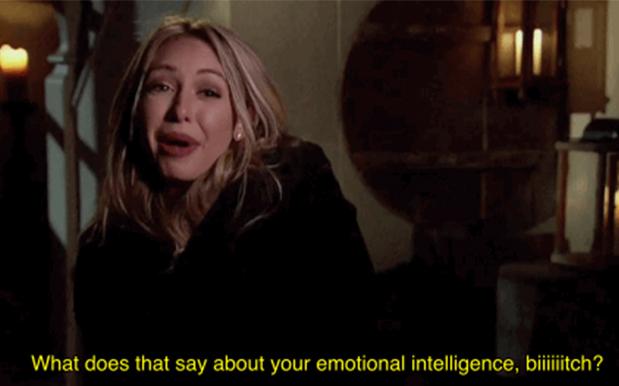
We’ve teamed up with Village Roadshow‘s new release Before I Fall (in cinemas March 2nd) to send you on a path to self realisation.
Don’t worry, Emotional intelligence was a foreign concept to me as well until I was watched a recent episode of The Bachelor US – and heck, if contestants on a bloody “reality” TV show know what it is I figured I better do my homework, stat.
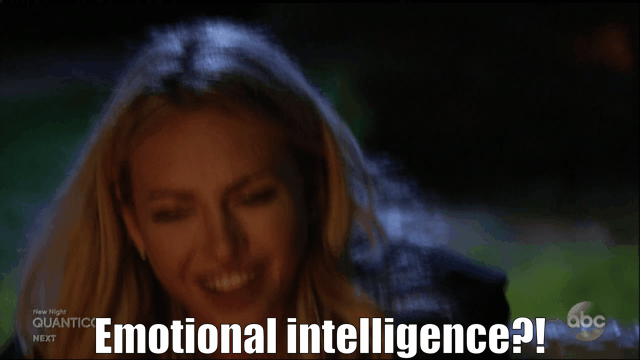
You and me both, Corinne.
So what exactly is it? Well, basically emotional intelligence – commonly referred to as EI or EQ – is being able to read other’s emotions as well as your own. It has been deemed a key to not only personal success but professional success too, with average IQ holders outperforming high IQ holders because of their impressive EI capabilities.
In fact, the world’s leading provider of EI tests, training and consulting – TalentSmart – asserts that EI is the single biggest predictor of workplace performance and the strongest driver of leadership / personal excellence, after testing it amongst 33 other workplace skills. If that’s not enough to get ya keen, then you might might be interested to know how EI can help you make more dosh.
TalentSmart Co-Founder Travis Bradberry said:
“The link between emotional intelligence and earnings is so direct that every point increase in emotional intelligence adds $1,300 [approx. $1,700 AUD] to an annual salary.
These findings hold true for people in all industries, at all levels, in every region of the world. We haven’t yet been able to find a job in which performance and pay aren’t tied closely to emotional intelligence.”
SIGN. ME. UP.
Unlike regular intelligence (which is your ability to learn and stays relatively unchanged throughout your lifetime), emotional intelligence can be acquired and improved with a little patience and practice.
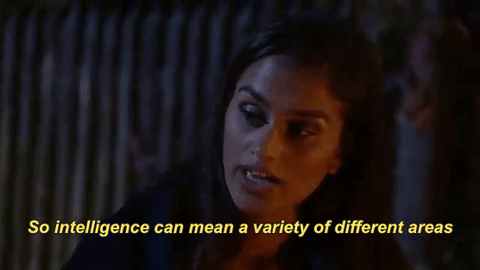
Yes, some people are naturally more emotional intelligent than others and kinda born with it (if you will) while for others, well, it’s acquired.
To help y’all get up to speed with your own EI so you can use it to your benefit, it’s essential to break down the four major components of it, broken into two parts: personal and social.
1. Self Awareness
Recognise what you’re feeling and clearly understand your own abilities and current limitations to have a greater sense of self confidence.
2. Self Management
Have a grip on your emotions so they don’t get in the way of what you’re doing, and so that you can stay focussed and positively direct your behaviour.
3. Social Awareness (+ Empathy)
Pick up on how other people are feeling in order to understand what is really goin’ on.
4. Relationship Management
Listen, ask questions and understand the other person’s or group’s needs to foster open communication and manage interactions appropriately.
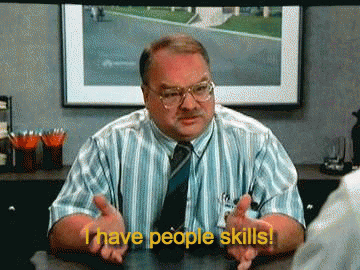
Alright, now that we’ve got that covered, you should be able to understand where you sit on the EI scale. Now, for how to strength or improve your EI levels.
KNOW YOUR PLACE
First step is acknowledging your strengths and weaknesses in expressing and repressing your emotions, as well as reading the emotive signals of others.
As Marc Brackett from Yale’s Center For Emotional Intelligence says:
“Labelling your emotions is key. If you can name it, you can tame it.”
Funny, that one didn’t work for my deplorable ex-boyfriend but hey, academics know their stuff.
PUT EMOTIONS TO GOOD USE
Psychology Today‘s personality analyst John D Mayer explains that people with high EI know how to take advantage of their emotional episodes as an opportunity to think in a certain way.
For example, sadness promotes analytical thinking and helps us connect and empathise, while happiness is a driver of action.
On the flipside, you can also use this knowledge to leverage other peoples emotions which is kinda savage, but yolo. So if sadness evokes connection and empathy, hitting up your boss for a pay rise if they’re having a bad day might be the way to go (I’ll see you in hell), and send out the invitation to do so when they’re feeling happy, because they’ll be more likely to accept. Sneaky or strategic? Dunno.

SCRAP THE NEGATIVITY
You know the feeling when someone doesn’t text you back and you jump to all kinds of conclusions, including but not limited to: “Stacey’s a total mole“?
Try and be flexible. Like Nicole Kidman‘s hands.
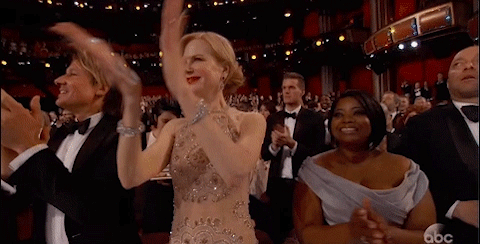
Stacey might not actually be a mole but in fact she’s driving and being a responsible adult who doesn’t text and drive. Create a myriad of reasons that Stacey’s not writing back before jumping to the crappiest ones. Being a Negative Nancy 24/7 will only overwhelm you and direct your workplace behaviour to an unwanted place, which is the opposite of good Self Management (#2).
Also, remember that not everything’s about you (hard, I know). Whatever Stacey’s doing, she’s probably doing it for her and not for you, and widening your perspective in this way can reduce misunderstanding.
DON’T BE A SCAREDY CAT
Similarly to the above, fear is another negative emotion that can get in the way of your work. What I’m asking you to do here, is to create a silver lining or positive result wherever a negative outcome is possible.
For example, you might normally think: “I hope Martha gives me a pay rise. If she doesn’t I’ll have to leave this place.”
But what you should think is: “I hope Martha gives me a pay rise, but even if she doesn’t it’ll be good to know where I stand, and how I can move forward in the business.”
KEEP CALM & STAY POISED, DARLINGS
You’re either one of two people in stressful situations: a) calm, collected and working on a solution, or b) as frazzled as your 13-year-old self when you walked in on your parents doing the nasty. The latter is not what you want, obviously.
There are ways to manage stress: get fresh air, apply cold water to your face (reduces anxiety), manage your caffeine intake (it can make your extra nervy), incorporate exercise into your life or try a quick breathing exercise.
Seriously, you need to focus.
Emotional Intelligence author Daniel Goleman says that EI refers to two different types of focus:
“First: an inward awareness of our thoughts and our feelings, and applying that in managing our upsets and focus on our goals. Second: a focus on others, to empathise and understand them, and on the basis of this to have effective interactions and relationships.”
Don’t like any of the above? Go do a poo and take a big old breath before flipping tables over the deadline that just moved forward.
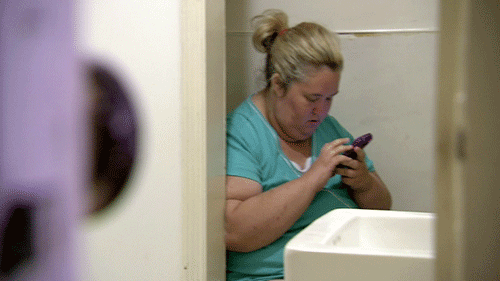
DEAL WITH D-BAGS EFFECTIVELY
There’s always one D-bag in every office who can derail your progress, but don’t give them the satisfaction hey.
Others think this can be a fault, but I always try and take a walk in the resident douche’s shoes, even if those shoes are kitten heels I wouldn’t be caught dead wearing. For example, “Jesus, Gemima is bitchier than my Chihuahua this week” can be flipped to “Jesus, Gemima is bitchier than my Chihuahua this week, but I’d be annoying too if I were experiencing a dry spell.” Trying to understand where they’re coming from before getting bothered by their ways. is called empathy…
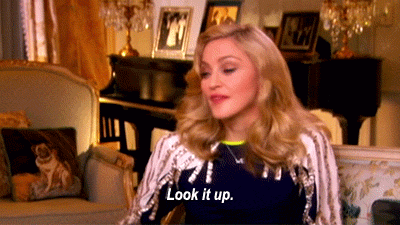
That being said, being empathetic does not excuse behaviour that’s not on. If Gemima says something discriminatory about race, sex, gender and so on, it’s not at all OK just because she didn’t get a root on the weekend. However, remember that Gemima’s actions say more about her than they do you, and by depersonalising you can view the situation objectively and come up with a solution.
X, Y, Z: IT’S AS EASY AS 1, 2, 3
All you need to know when trying to be agreeable in a disagreeable situation is the X, Y, Z method: I feel X when you do Y in situation Z.
It gives the context you both need to move forward, whether it’s that you feel good when they ask your opinion in a meeting, or that you feel discouraged when they don’t give you feedback in a review. It’s all constructive criticism, whether that criticism is good or bad, it’s just about spelling it out as clear as possible for everyone.
I hope you’ve learned something today because I sure as hell have: I won’t be watching The Bachelor again unless I can ascertain their dumbness before I turn the telly on.
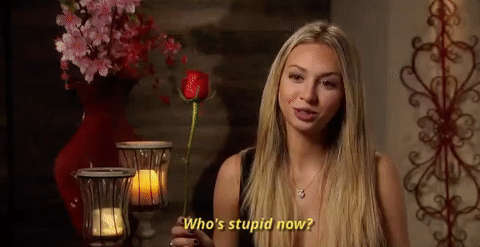
To get inside your head even more, hit up the new Zoey Deutch‘s flick Before I Fall in cinemas March 2nd. If you think you’re feeling self-realised after reading this novel (sorry), you ain’t seen nothing yet. Catch the trailer here.
Photo: The Bachelor / ABC.



